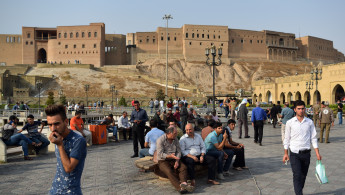Fears of a Turkish 'occupation' of Iraqi Kurdistan region grow among Kurdish observers
Kurdish political observers warn that Turkey's strategy behind its cross-border military incursions into the Iraqi Kurdistan Region (IKR) is not about simply fighting the Kurdistan Workers Party (PKK), but rather is "to occupy the region and revive the dream of the Ottoman Empire."
On April 18 Turkey launched "Operation Claw-Lock" against the PKK in the Metina, Zap and Avasin-Basyan areas of the Iraqi Kurdistan region. Turkish Defence Minister Hulusi Akar on Monday said it had "successfully completed the first stage" of its operation.
The New Arab conducted a phone interview with Kamaran Mantik, an Erbil-based Kurdish political science professor, on Turkey's main goals regarding its ongoing military operations in the northern Iraqi Kurdistan region.
The New Arab also spoke to Yusuf Mohammed, the former speaker of the Kurdistan parliament, who has a PhD in political philosophy.
"Turkey's successes in its military incursions in the [Iraqi Kurdistan] depends on the international power balance and the conflicts in the region. But, Turkey has a clear strategy to re-annexe the region and resurrect the Ottoman Empire," Mantik claimed.
"Turkey is carrying out this strategy gradually. Every year, it occupies some areas, especially the strategic mountain peaks inside the [Iraqi Kurdistan], and established military bases, roads and other things for its future operations," he added.
Mantik also said that the current Turkish incursion in the region is an extension of its previous operations since 2015 against Syrian Kurds (Rojava) and establishing a safe zone.
"Turkey's strategy is a dangerous, and based on occupation and altering the demography of areas it occupies," he argued.
"Kurds are not in a position to be able to face looming threats," he added, clarifying that Kurds need to understand Turkey's strategy, as well as the international policy, rationally and far from emotions.
"Differences among the Kurds have greatly facilitated Turkey's goals. I think if the Kurds have a unified political or military stance against Turkey, then it would restrict Turkish aggressions. But, Turkey currently exploits part of the Kurds against their fellow brothers," the professor said.
He further noted that Ankara seems to also have the support of Tehran, despite any claims that Iran was a close ally to the PKK.
Balanbo Mohammad Ali, an MP from the ruling Patriotic Union of Kurdistan (PUK) and member of the Kurdistan parliament's peshmerga committee claimed to The New Arab on April 20 that forces loyal to Masoud Barzani's Kurdistan Democratic Party (KDP) are actively supporting the Turkish army in its fight against the PKK in the Kurdistan region.
PKK fighters are located in a rigid triangle mountainous area on the Iraq borders with Turkey and Iran. Both the KRG and the ruling KDP have continual requested that the PKK members leave the IKR and fight the Turkish army inside Turkey.
"The basis of the question is wrong since the PKK is inside Iraq, that have full sovereignty, and the existence of the PKK in Iraq and namely in the Qandil Mountains should have been according to a deal," Mantik emphasised, "But Turkey also breaches Iraq's sovereignty. The question should be why can Turkey breaches Iraq's sovereignty and the international community remains silent, while responding to Russia's breaching of Ukraine's sovereignty?"
On his part, the former speaker of the Kurdistan parliament, Yusuf Mohammed, also said to TNA that Turkey's aim in northern Iraq is far beyond simply fighting the PKK militants.
"It is a pretext for Ankara's expansionist strategy to occupy the region since Turkey wants to restore the former Mosul vilayet of the Ottoman Empire by 2023, 100 years after the Treaty of Lausanne," Mohammed said. "Part of the PKK forces moved to Qandil Mountain from 2012 until 2014 as per an agreement with Turkey when both sides were negotiating the peace process."
He also believes that Turkey also aims to control the region’s vast energy resources including the Kirkuk oil fields.
When asked why he thinks the KDP is aiding Turkey against the PKK, Mohammed said, "Since its creation in 1946, the KDP deems itself as a feeble force within the IKR, and it thinks it needs an outsider's support to survive."
Other Kurdish parties inside the KRG, the PUK and the Change Movement, of which Mohammed was once a member, has not expressed a clear stance as of yet regarding the Turkish incursion into Iraq.
"Other forces within the KRG are passive. They are unable to have clear stances on the Turkish offensives, as well as speak out against the bad deeds by the KDP within the KRG," he added.





 Follow the Middle East's top stories in English at The New Arab on Google News
Follow the Middle East's top stories in English at The New Arab on Google News


